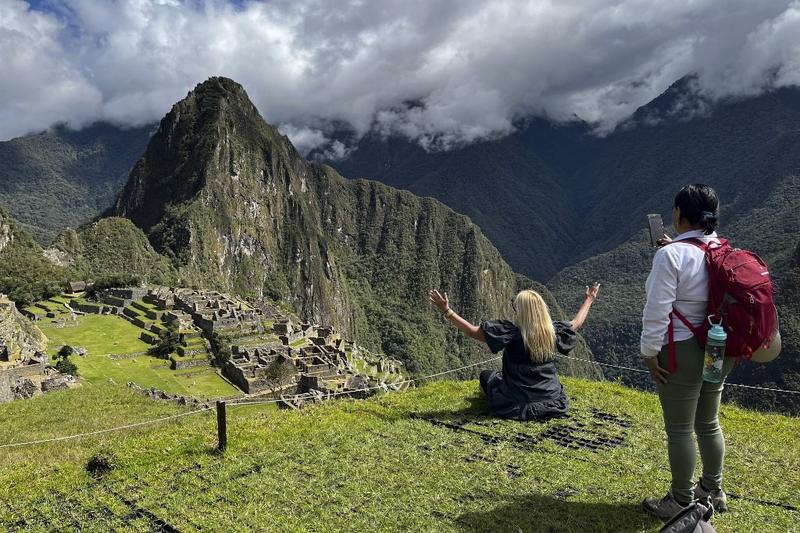 Tourists visit the ancient Inca ruins of Machu Picchu in the Urubamba valley, seventy-two kilometers from the Andes city of Cusco, on Feb 15, 2023. (PHOTO / AFP)
Tourists visit the ancient Inca ruins of Machu Picchu in the Urubamba valley, seventy-two kilometers from the Andes city of Cusco, on Feb 15, 2023. (PHOTO / AFP)
BERLIN - Tourists around the world and especially in Europe are supportive of more eco-friendly trips but reluctant to carry the extra cost, according to studies and industry executives.
In the European Union's economic powerhouse Germany, for example, 24 percent of travelers believe ecological sustainability is an important criterion when booking a holiday, according to a survey by motor vehicle association ADAC released this month.
But only 5-10 percent would be willing to pay even a moderate sustainability surcharge, acccostording to the poll of 5,000 people.
Some travel operators insist that climate-friendly tourism need not cost the world and can sometimes even be the cheaper option, encouraging habits such as reusable water bottles and use of bikes or public transportation
"The rub is people don't want to necessarily pay more for sustainability," said Charuta Fadnis, head of research and product strategy at travel research company Phocuswright.
ALSO READ: Tourism surge set to boost regional economy
That has left the industry questioning how to become greener as it faces thin margins and a post-pandemic recovery still hampered by global travel restrictions.
Carbon offsets have been available on the market for years, with many airlines offering voluntary investment programs. But the uptake has been limited and there are questions over how effective offsets actually are.
Thomas Fowler, the director of sustainability for Irish budget airline Ryanair told Reuters earlier this year that few are willing to pay the few euros needed to take part in their carbon offset program.
"Less than 3 percent of our customers use it," he said.
Germany's flagship airline Lufthansa in February began offering more expensive "green fares" on some flights, said to offset their burden on the climate by 20 percent through the use of sustainable aviation fuel (SAF) and 80 percent through the financing of climate protection projects.
This is integrated into the price, unlike Lufthansa's existing opt-in charges, for which uptake has been very low at 0.1 percent, according to the company. A trial run for the new integrated offer in Scandinavia showed a modest but improved uptake rate of 2 percent.
Green on a budget
The younger generation is more committed to sustainability, said Fadnis. But without willingness to pay slightly more upfront, businesses have to become more creative.
Many hotels, for example, ask those who stay there to reuse their towels, while other travel services encourage tourists to adjust their habits by renting hybrid cars.
Some travel operators insist that climate-friendly tourism need not cost the world and can sometimes even be the cheaper option, encouraging habits such as reusable water bottles and use of bikes or public transportation.
Time-slot bookings, made ubiquitous during the pandemic, have become a tool to prevent overcrowding and minimize visitors' footprint locally.
READ MORE: Asia-Pacific tourism to 'rebound to pre-COVID level by 2024'
GetYourGuide, a Berlin-based platform for booking travel experiences, said this was one way it was reducing its impact, for example with queue management at the Vatican.
"That is much better than people ... waiting for four hours ... at the Vatican, you know, trashing the place" GetYourGuide CEO Johannes Reck said.
Demand for greener offers is helping some businesses, but there are certain demographics that will remain stubbornly opposed to even marginal price hikes - particularly those over 55.
"They're averse to pain," Fadnis said.


